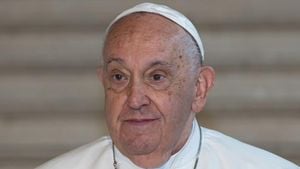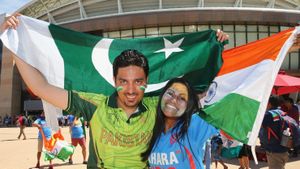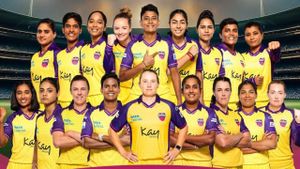On December 12, 2024, Papua New Guinea made headlines with the announcement of the new addition of its very own National Rugby League (NRL) team, set to debut in 2028. The press event held at Parliament House, Sydney, saw Australian Prime Minister Anthony Albanese shake hands with his Papua New Guinean counterpart, James Marape, solidifying the culmination of two years of negotiations and planning between the two nations.
This historic milestone is enveloped not only in sporting excitement but also political significance. The Australian government is investing AUD 600 million (approximately USD 380 million) over the next decade as part of this agreement. The establishment of the rugby league team is viewed as much more than just sports—it is seen as a strategic diplomatic effort aimed at strengthening Australia’s ties with its nearest neighbor and curbing China's advancing influence in the Pacific region.
During the announcement, Prime Minister Albanese expressed the importance of the relationship between Australia and Papua New Guinea, saying, “A Papua New Guinea NRL team is a game-changer for Australia’s relationship with PNG and a unifying force — no two countries have a greater passion for rugby league.” Rugby league is not just the most popular sport in Papua New Guinea, but it serves as a cultural cornerstone for the nation of 12 million people, often overshadowed by issues such as subsistence farming, tribal violence, and rising crime rates.
Marape also echoed similar sentiments, emphasizing the significance of this new team as pivotal for fostering unity within the nation. “This one team will be for one people, one country, one nation, a national unifier. An NRL team for PNG is more than just sports — it is a national unification strategy,” he stated. The Prime Minister made it clear underlining the significance of sports and people-to-people relations, leaving no room for doubt about the importance of this initiative.
While the final legal documents for the establishment of the team are expected to be signed shortly, the team itself remains unnamed and will become either the 18th or 19th franchise of the NRL, depending on the league’s expansion plans. Players who come to play for the Papua New Guinea team will receive tax incentives and live within the confines of a secure compound organized and funded by the PNG government, reflecting the serious commitment to making this venture both safe and attractive for incoming talent.
With the window for recruitment set to open only after the conclusion of the current NRL season, the team will begin scouting prospective players from other NRL clubs after November 2026. The inclusion of Papua New Guinea’s team is already being perceived as not just the birth of another franchise but as part of broader geopolitical dynamics, particularly with Australia’s intent to counterbalance China’s rising investments and influence within the region.
China has engaged with Pacific island nations through various bilateral security arrangements, intensifying the regional security and diplomatic rivalry. The announcement of this new rugby league team seems to be Australia's strategic response to solidifying its longstanding role as Papua New Guinea's primary security partner. Albanese expressed hope concerning the synergy between the two countries, stating, "The security in the Pacific is primarily the responsibility of the Pacific family is a principle we share.”
This deal adds another layer to the bilateral security agreement signed earlier between the two nations, which is aimed at bolstering Papua New Guinea’s internal security efforts, particularly in policing, courts, and prisons. Marape reassured attendees of the press conference about the safety measures taken, saying, “The player is safe when we have good rapport between our two police forces.”
Indeed, rugby league serves as both entertainment and metaphorically symbolizes the bond between the two nations. For Papua New Guinea, the arrival of their own team isn’t merely about winning matches; it’s also about reaffirming national identity, pride, and connection to Australia. This bond, deep-rooted through shared history, will have significant ramifications beyond the field.
While political leaders are optimistic about the positive outcomes this could lead to, there remain pragmatic concerns about the execution and sustainability of this venture. With Papua New Guinea at times grappling with challenges like instability and economic hurdles, how effective can this funding be put to use? Can sporting teams thrive amid societal issues? Critics may voice concerns, but for many enthusiasts, hopes are high, and the excitement for this new chapter is palpable.
Looking toward the sports calendar, the Rugby League World Cup scheduled for 2026 will overlap with Papua New Guinea's introduction to the NRL, creating opportunities for visibility and engagement for the country's burgeoning sports scene. The international competition will serve as both a stage and proving ground as the nation seeks to root itself firmly within the rugby league community.
Australia’s financial commitment reflects both the investment of the Australian taxpayer and the long-term vision for the Pacific region. It’s not just about rugby; this could cultivate broader educational and economic exchanges and inspire future endeavors spanning multiple sectors including healthcare and the environment—fostering mutual benefits and partnerships.
While the path to 2028 appears bright, the execution of the new franchise must remain adaptable to the challenges and dynamics of the region. Establishing stability, keeping safety measures intact, nurturing player development, and building effective infrastructure are all aspects requiring careful attention. This once-in-a-lifetime chance for Papua New Guinea to shine on such grand stages compels the leaders and citizens alike to unite, not only as fans of rugby but as stakeholders contributing to the dream of lasting change.
The world will be watching closely as Papua New Guinea navigates its ride to the NRL—one of resilience, joy, and the unwavering spirit of its people. With the NRL serving as the arena, diplomacy is bound to play its part on the field, showcasing the beauty of sports transcending borders and reinforcing the importance of relationships among nations everywhere.



